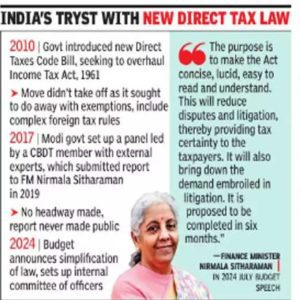A new law can be brought in place of the 63-year-old Income Tax Act. A bill related to this can be introduced in the budget session. The existing law is very complex and many of its sections have now become redundant. But the government is also worried about a fear…
New Delhi: Finance Minister Nirmala Sitharaman is going to introduce a bill for a new direct tax law in the budget session. It will focus on simplifying the provisions, removing unnecessary provisions and making the language more friendly to the common man. Sources said that the committee working on the amendment is deciding whether the new law replacing the 63-year-old Income Tax Act will be in two parts or three parts. Although the government had indicated that the draft law would be released for public comments by a panel of officials. But the government has decided to give a strong message at a time when it is facing criticism for complex tax laws. The government will introduce a bill in this regard which can later be amended based on the feedback received from taxpayers and experts.
Officials from the Finance Ministry and the PMO worked closely with the panel over the last six-eight weeks to get it ready by the time the budget is presented. Sitharaman had announced this in the July budget. She is expected to mention this law in her budget speech on February 1. However, it is not yet decided whether the bill will be introduced in the first part of the budget session or in the second part.

What is the government afraid of
This is at least the third attempt to redefine the Income Tax Act since the Direct Tax Code Bill was introduced in Parliament in 2010. The Modi government had set up a panel of experts whose report has not been made public and the recommendations have largely not been accepted. The committee has been asked to ensure that thousands of provisions from the old law are deleted in the new law. This law contains many sections that have been made redundant due to deletions from the Income Tax Act in the last few years.
A source said the language may be difficult for the common man to understand and the committee has been asked to make it as simple as possible. However, the government is not introducing new issues in the proposed law, at least not for now. However, officials cautioned that the change in language could lead to litigation as taxpayers would want new interpretations in many cases.